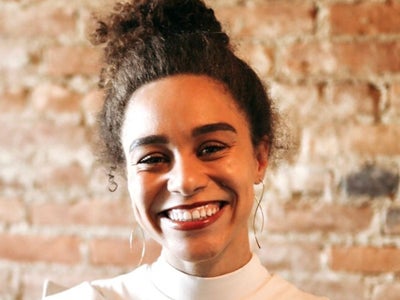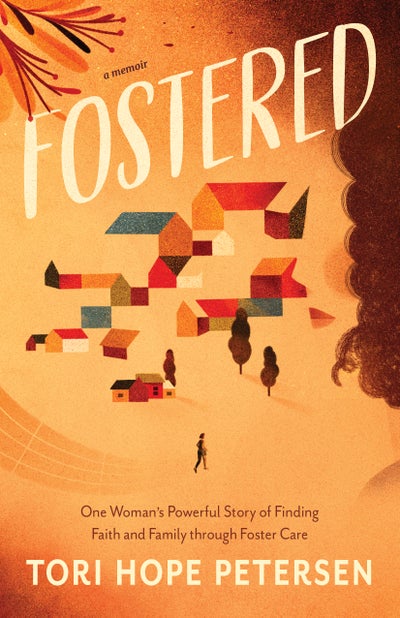
Beautiful endings can manifest despite not so pleasant beginnings. Former foster youth and foster care advocate Tori Hope Petersen understands that sentiment all too well. After aging out of the foster care system at the age of 18, Peterson met a coach whose mentorship forever changed the trajectory of her life, going on to become a Track and Field All American and Mrs. Universe. In her new book, Fostered: One Woman’s Powerful Story of Finding Faith and Family Through Foster Care (B&H Publishing), the now mother of three shares powerful and transparent vignettes that give a glimpse into the life of a foster child.
Petersen was conceived out of rape and birthed by a mother who struggled with mental health. Despite a childhood that was >foster care system, family shelters, juvenile group homes etc.] and bring healing and wholeness to them.”
ESSENCE spoke with Petersen about her new memoir Fostered, her faith-based approach to foster care advocacy, unplanned pregnancy, and the one question that she wished a trustworthy adult would have asked her while she was in foster care.

Can you share some of your testimony about growing up in the foster care system and how you overcame your childhood trauma?
Petersen: I first went into the foster care system when I was 3 years old. I didn’t want to go into the foster care system, because as a child, I wanted to live with my mom. I thought the life>mental illness continued to get worse and as a result the abuse and neglect got worse. But you know what? There’s a quote by Mary Oliver and it states, “Someone once gifted me a box of darkness.” It has taken me time to realize that this too is a gift. I think that’s how I would describe overcoming childhood trauma. Experiencing trauma, and overcoming it has really molded me, and shaped me into the woman that I am. It is the reason that I do advocacy, that I care about social justice, and that I care deeply for people. I do not want people to suffer. I want to love them through their suffering.
How did your struggles and experiences in the foster care system strengthen your relationship with God?
Petersen: I began to understand that God lived a human life as Jesus and the pinnacle of Jesus’s life was suffering. He suffered because He loved, and his suffering was not wasted. I found hope in suffering that Jesus endured for us. If we, as God’s people, are made in His image that means that we are meant to reflect him. So, if we’re meant to reflect Jesus, that means that our suffering is not wasted and that our suffering can somehow translate into love. And, sometimes that’s a mystery, right? Like how that’s actually done is a mystery to us all. But if God wasn’t a mystery, would he really be a God at all?
There are a lot of conversations about Roe v. Wade being overturned, and the reality of unplanned pregnancies. For those who may not be clear about pro-life values, can you share what it means to have pro-life values?
Petersen: Yes. Having pro-life values means that we believe that every life has inherent dignity, no matter how it comes into the world, whether it’s in a womb or whether it’s walking outside in some capacity. I did have an unplanned pregnancy while I was attending one of the most conservative colleges in the nation. I was very disappointed at some people’s reactions. When I announced my pregnancy, I felt that I wanted to be consistent in my beliefs, and I never questioned whether I was going to give my son life. I knew that that’s what I was going to do. But, at the same time, I really understood the tension and the hardship that many women can face when they do have an unplanned pregnancy. I think that it’s really important that we celebrate life, even when it’s surprising to us, even when it’s inconvenient to us. No matter if that life is in the womb, or that life is in foster care. No matter if that life is disabled, no matter what, we celebrate it.
What would you say to those who have experienced abuse in foster care? What does it mean to contradict trauma?
Petersen: I would tell them that hurting people often perpetually hurt others. And that’s a real reason to have em>generational trauma that has been placed on you, or you can change the narrative. You can say, I’m gonna do the hard work and I’m gonna be a healed person who has a part in healing, the hurting. You have a choice to do the hard work. And, when it comes to contradicting trauma, it’s also a choice. Contradicting trauma is putting ourselves in situations in front of people. I would encourage people, whether they’ve experienced trauma or not, to realize that you never know what someone else is going through. You never know what they’ve been through, and you never know how you are going to contradict that person’s trauma, and essentially bring healing to them.
In the context of America’s political environment, can you speak to some of the benefits of giving one’s newborn baby up for adoption?
Petersen: If we really value human beings and true social justice, then the goal is to end the suffering. And, so as social justice advocates, and as people who care for humanity, we have to change the systems. We have to start with ourselves and step into these broken places and bring healing and wholeness to them.
What is one question that you wished a trusted adult or guardian would’ve asked you while you were navigating the foster care system?
Petersen: That is a really good question. You know, I wish that someone would’ve asked me why I was doing what I was doing. I needed that question to reflect and understand more about myself, because in high school I was kind of a bully. I was kind of mean to people and it still breaks my heart to say that. But I was a hurt person who hurt people, even though I didn’t want to be that way. I wish that someone would have called me out and said, “Tori, why are you doing this?” So, I could have looked at myself and said, “Oh, I’m treating all of these people the way people have treated me.” And maybe I could have worked through that at a younger age. I could have been kinder and more loving at a younger age had someone truly inquired what was going on with me.
What are some ways that church communities can be more supportive of women and teenage girls and boys, and what does it mean to be radically hospitable?
Petersen: For Believers, the Holy Spirit literally dwells in us, which means we have the power to step into the most broken circumstances and bring healing to them. So, I think first off, that we need to stop telling ourselves that it’s someone else’s responsibility to create change, and that this time is too crazy. No. We were made for such a time such as this. We were made for this time, and we need to step into it. We need to be braver, and bolder. We need to remember what image we are made in, which is God’s. One of the practical things that we can do is offer foster families more support. 50% of foster parents quit being foster parents after a year in. It’s because it’s hard to navigate difficult times without a strong sense of community. Most foster families don’t have communities in the church wrapping their love and support around them. The solution is not that everyone has to become foster parents, but rather that everyone should aim to support one another in some capacity.
What are three key takeaways that you hope readers will glean from your book Fostered?
Petersen: I hope that the readers of my book Fostered are encouraged to love people not just in word, but in how they reflect Jesus. I hope that they really put love into action. The second thing is that I hope that they do see that we can all play a part in serving the most vulnerable in the marginalized populations in our society. And the third thing I would say is that the way we see people is often the way that we see ourselves. So, I want my book to be an encouragement for people to see others, especially those who are on the outskirts and those who get pushed out. I want people to see the foster community as God sees them. He sees them as the beloved children of God that they are.
Learn more about Tori Hope Petersen and her advocacy work here.
TOPICS: foster careThe post Tori Hope Petersen On Faith And Learning To Contradict Trauma After Growing Up In The Foster Care System appeared first on Essence.

0 Commentaires